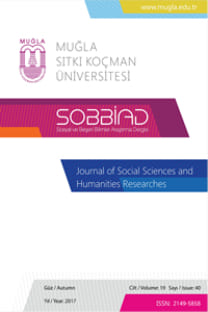Klasik ve Neo-Klasik Dönemde Örgütsel Güvenin Karşılaştırılması Üzerine Bir Deneme
Örgütsel güven günümüzde, örgütsel başarının arttırılması, etkinlik ve verimliliğin yaratılması açısından büyük önem taşımaktadır. Bu çalışmada örgütün başarılı, etkin ve verimli olmasının, örgütte yöneticiler ile çalışanların birbirine duydukların güvene büyük ölçüde bağlı bulunduğu görüşünden hareketle tarihsel bir analiz sunulmaya çalışılacaktır. Çalışmada örgütsel güven; yöneticiler ile çalışanlar arasındaki ilişkiler açısından ele alınmakta ve güven duygusunun klasik ve neo-klasik yönetim düşüncesinin egemen olduğu tarihsel süreç içinde niteliği incelenmektedir ve karşılaştırılmaktadır. Bu çalışmanın amacı; yönetim bilimi tarihi açısından klasik ve neo-klasik dönemde örgütsel güven kavramını analiz etmek ve bu dönemlerde yöneticiler ve çalışanlar arası ilişkileri güven kavramı bağlamında değerlendirilmektir.
Organizational trust is of great significance today, when viewed in the perspective of the increase in the organizational success, and of the creation of efficiency and productivity. This study will try to present an historical analysis starting from the view that the organization’s success, efficiency and productivity are dependent, to a great extent, on the mutual trust developed among the managers and employees. In the study organizational trust is dwelt on as a feeling mutually developed by managers and employees and then it is examined and compare the development of this feeling, during the historical process where the classical and neoclassical management idea is dominant. The aim of the study is to analyse the concept of the organizational trust from the perspective of the history of management science, during the classical and neo-classical period and to explore and compare the meaning attributed to the concept of trust, in the inter-organizational relationships during the same period.
- ISSN: 2149-5858
- Yayın Aralığı: Yılda 2 Sayı
- Başlangıç: 2000
- Yayıncı: Mugla Sitki Kocman University
Sayıdaki Diğer Makaleler
Sâsâni İmparatorluğu’nun Devlet Yapısı Üzerine Bir İnceleme
Avrupa Birliği Ortak Enerji Politikası
Cüneyt Yenal KESBİÇ, Hasan ŞİMŞEK
Yatırım Projeleri Kapsamında Mali Etüd Üzerine Bir Çalışma
Erdoğan GAVCAR, Meltem ÜLKÜ, Seçil EKMEKÇİ
Çalışma Yaşamında Işık ve Aydınlatmanın Önemi
Klasik ve Neo-Klasik Dönemde Örgütsel Güvenin Karşılaştırılması Üzerine Bir Deneme
